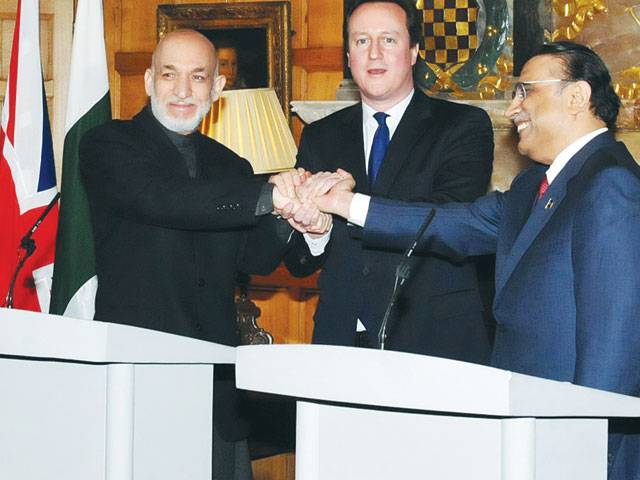LONDON - The leaders of Pakistan and Afghanistan said on Monday they would work to reach a peace deal within six months, while throwing their weight behind moves for the Taliban to open an office in Doha.
Following talks hosted by British Prime Minister David Cameron, President Asif Ali Zardari and his Afghan counterpart Hamid Karzai also urged the Taliban to join the reconciliation process in Afghanistan.
Cameron, whose country is the second biggest contributor of troops to Afghanistan with 9,000 troops still in the country, appealed directly to the Taliban to join the reconciliation process.
“Now is the time for everyone to participate in a peaceful, political process in Afghanistan,” he told a press conference after the talks. At a news conference with Karzai and Zardari, Cameron said “an unprecedented level of co-operation” had been agreed between Pakistan and Afghanistan.
The discussions had centred on both the Afghan-led peace process and on strengthening co-operation between Pakistan and Afghanistan, he said.
Foreign ministers, military leaders and intelligence chiefs attended the talks for the first time.
President Zardari and Karzai reaffirmed their aim to work towards a strategic partnership.
They said they hoped to sign an agreement strengthening ties on economic and security issues, including trade and border management, later in the year.
The joint statement said all sides had agreed on the urgency of the Afghan peace process and “committed themselves to take all necessary measures to achieve the goal of a peace settlement over the next six months”.
“They supported the opening of an office in Doha for the purpose of negotiations between the Taliban and the High Peace Council of Afghanistan as part of an Afghan-led peace process,” the statement said.
Karzai had previously shunned the idea of a Taliban office in Doha because of fears that it would lead to the Kabul government being frozen out of talks between the United States and the Taliban.
“All sides agreed on the urgency of this work and committed themselves to take all necessary measures to achieve the goal of a peace settlement over the next six months,” they said in a joint statement issued by Cameron’s office.
President Zardari and President Karzai also ‘re-affirmed their commitments’ to signing a Strategic Partnership Agreement (SPA), to encourage closer ties.
The joint statement also said that the Afghan and Pakistani leaders had agreed arrangements to “strengthen co-ordination” of the release of Taliban detainees from Pakistani custody.
Afghan peace negotiators have welcomed Pakistan’s release of dozens of Taliban prisoners in recent months, a move they believe could help bring militants to the negotiating table.
There was no immediate reaction from the Taliban.
The summit was the third trilateral meeting in a year following meetings in Kabul in July and New York last September — but the first in which Pakistani and Afghan army and intelligence chiefs took part.
Karzai told the press conference he hoped in future to have “very close, brotherly and good neighbourly” relations with Pakistan.
Support from Pakistan, which backed Afghanistan’s 1996-2001 Taliban regime, is seen as crucial to peace after Nato troops depart — but relations between the neighbours remain uneasy despite some recent improvements.
Zardari said it was in Islamabad’s interests to support the initiative. “Peace in Afghanistan is peace in Pakistan. We feel that we can only survive together,” he said. “We cannot change our neighbourhood or our neighbours.”
The Taliban in March 2012 suspended contacts with American representatives in Qatar over a potential prisoner exchange and opening a liaison office in the Gulf state, and publicly refuses to negotiate with Kabul.
Traffic on one of Britain’s busiest motorways was slowed down on Sunday night as a motorcade accompanied by police cars with blue flashing lights took the dignitaries to Cameron’s country residence, an AFP reporter saw.
In an interview with Britain’s Guardian newspaper and ITV television station released late Sunday, Karzai said the biggest threat to peace in Afghanistan was not the Taliban, but meddling from foreign powers.
“Peace will only come when the external elements involved in creating instability and fighting, or lawlessness in Afghanistan, are involved in talks,” he said, without naming any particular country.
The president also suggested Western troops had been “fighting in the wrong place” in Afghanistan, saying security in the southern Helmand province was better before British troops arrived there.
A spokesman for Cameron would not say if the prime minister agreed with Karzai’s characterization that security in Helmand was better before UK troops arrived. “We believe progress is being made,” Jean-Christophe Gray said. “That’s why we think the approach that we’re taking is the right one.”
Saturday, April 20, 2024
Afghan peace deal within six months

Police intensifies crackdown on polluting vehicles
April 20, 2024
Health activists for ban on small cigarette packs
April 20, 2024
Flower show attracts students in Agri University
April 20, 2024
Policitising Tragedy
April 20, 2024
Tehran to Rafah
April 20, 2024
A New Leaf
April 20, 2024
A Tense Neighbourhood
April 19, 2024
Dubai Underwater
April 19, 2024
Dangers of Deepfakes
April 20, 2024
Feudalism
April 20, 2024
Kite tragedy
April 19, 2024
Discipline dilemma
April 19, 2024
Urgent plea
April 19, 2024
ePaper - Nawaiwaqt
Advertisement
Nawaiwaqt Group | Copyright © 2024





